It was Saturday morning. I took Line 2 to Dongseoul Bus Terminal and then cruised down the highway to Cheongju. This time, however, I was not there on Jikji business (although I was carrying a copy of Jikji, and One NGO’s Lonely Fight to Bring It Home) in my bag. I asked the lady at the Cheongju Bus Terminal how I might reach the little town of Munui. Simple, she said—go out on the street and wait for the 311 bus. I did as directed and arrived half an hour later.
I disembarked and, first things first, started scouting a hotel. The city was not big, but it seemed rather lively; I knew I’d find a place. I had walked no more than two blocks before seeing a tastefully designed shop called Caffè Dadao, the Tea and Coffee Museum. No franchise this! Sitting there, just waiting for a 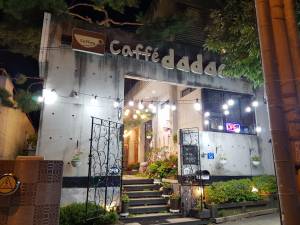 customer was Sung Kyung-sun. I soon learned that she was an artist with a degree from Cheongju University, although her mother was the actual proprietor. I told her of my desire to learn more about the history of Munui. The original, if I may use such a term, had been submerged under the waters of the newly created Daecheong Lake when the Geum River was dammed in 1980. Kyung-sun not only directed me to a nearby hotel, she arranged a meeting for later in the day with Dr. Kim Kyung-sik (a professor of film at Cheongju University knowledgeable on this topic) and his translator, Lee Soo-il. I thanked the young woman by giving her a “bring Jikji back to Korea” T-shirt.
customer was Sung Kyung-sun. I soon learned that she was an artist with a degree from Cheongju University, although her mother was the actual proprietor. I told her of my desire to learn more about the history of Munui. The original, if I may use such a term, had been submerged under the waters of the newly created Daecheong Lake when the Geum River was dammed in 1980. Kyung-sun not only directed me to a nearby hotel, she arranged a meeting for later in the day with Dr. Kim Kyung-sik (a professor of film at Cheongju University knowledgeable on this topic) and his translator, Lee Soo-il. I thanked the young woman by giving her a “bring Jikji back to Korea” T-shirt.
Finishing my coffee, I left and visited the local hyanggyo (Confucian school). Erected in the 16th century, it had been destroyed, rebuilt and moved several times. Like most hyanggyos, it no longer has an educational function, but Confucian ancestral rites are held there annually.
Directly across the street from my hotel was a shuttle bus stop for Cheongnamdae, the villa where Korean presidents go and entertain domestic and foreign guests. I handed over 9,000 won and was soon on my way. Built three years after the lake was created, it is 1.85 square kilometers of carefully manicured grounds, 2.3 kilometers of pathways, a two-story main building, a memorial hall, pavilions, gardens, a heliport, bronze statues of all the ROK’s heads of state—from Syngman Rhee to Moon Jae-in—and a fish pond. As I walked 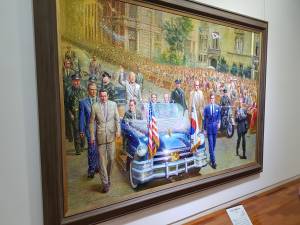 through the memorial hall, I paid special attention to the parts devoted to Lee Myung-bak and Park Geun-hye, both of whom are currently cooling their heels in the slammer. That is to say, they are incarcerated. And how about Roh Moo-hyun, who took a flying leap off a mountain in 2009? Or Chun Doo-hwan and Roh Tae-woo, both of whom could have won gold medals if “stealing from the national treasury” was an Olympic sport? I surely did not ignore Park Chung-hee, who led a military coup in 1961 and proceeded to subvert democracy for the next 18 years.
through the memorial hall, I paid special attention to the parts devoted to Lee Myung-bak and Park Geun-hye, both of whom are currently cooling their heels in the slammer. That is to say, they are incarcerated. And how about Roh Moo-hyun, who took a flying leap off a mountain in 2009? Or Chun Doo-hwan and Roh Tae-woo, both of whom could have won gold medals if “stealing from the national treasury” was an Olympic sport? I surely did not ignore Park Chung-hee, who led a military coup in 1961 and proceeded to subvert democracy for the next 18 years.
Cheongnamdae was, as I expected, a very pleasant setting. As I also expected, there was evidence of tight security with rolls of barbed wire and discreetly positioned Korean War−style military bunkers. I might have stayed longer, but a light rain had begun to fall and I needed to be back at Caffè Dadao by 5 p.m. to meet Dr. Kim and Ms. Lee. A rather tall man with a bright smile, he was ready for me. Playing on his Samsung laptop was an 11-minute video he had made about the town (consisting of 13 villages and 4,000 people) in the 1970s. I saw men, women and kids in thatched-roof homes, farming done with 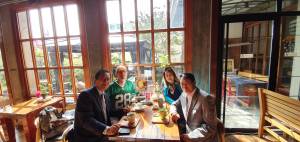 ox-drawn plows, school houses and so on. Life in old Munui was rustic. Dr. Kim explained how the decision to build a dam had been made by Park and completed under Chun. Few of Munui’s citizens were in favor, even though they received compensation. Some said no and resisted, but force was used at the end as the waters began to rise. Even now, after the passage of nearly 40 years, the anger and bitterness linger. Dr. Kim stated, however, that locals today are able to find a measure of pride in that big, shimmering lake which provides drinking water for Daejeon, Cheongju and 30 smaller cities, not to mention water for irrigation and industry. Pollution controls are stringently enforced, and fishing is not permitted.
ox-drawn plows, school houses and so on. Life in old Munui was rustic. Dr. Kim explained how the decision to build a dam had been made by Park and completed under Chun. Few of Munui’s citizens were in favor, even though they received compensation. Some said no and resisted, but force was used at the end as the waters began to rise. Even now, after the passage of nearly 40 years, the anger and bitterness linger. Dr. Kim stated, however, that locals today are able to find a measure of pride in that big, shimmering lake which provides drinking water for Daejeon, Cheongju and 30 smaller cities, not to mention water for irrigation and industry. Pollution controls are stringently enforced, and fishing is not permitted.
Saturday night in my hotel room, I alternated between reading my biography of Lincoln Steffens and watching TV as some bright young Korean boys played E-sports. They have coaches, corporate sponsors, leagues, tournaments, fan clubs and excitable commentators. If you are good, you can make a 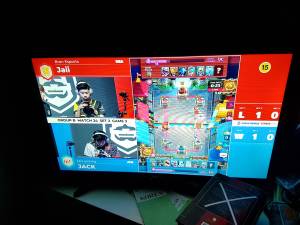 comfortable living playing E-sports. Here, the guys from FAV Gaming were facing Bren Esports in a contest called “King of the Hill.” I cannot pretend to understand any of this.
comfortable living playing E-sports. Here, the guys from FAV Gaming were facing Bren Esports in a contest called “King of the Hill.” I cannot pretend to understand any of this.
I got up the next morning, took a brisk 30-minute walk, checked out of the hotel and returned to Caffè Dadao. Awaiting me there were Kim Hong-ki and his friend Diana Ott. (This, too, had been set up by Kyung-sun.) As Korean as him, she had lived and worked in Florida for 30 years and thus spoke quite good English. Born and raised in Munui, he remembered well the feelings of being displaced in 1980. We talked for an hour, joined midway through by Dr. Kim. What I had heard the day before—that there is a sense of pride about Daecheong Lake, but mostly sadness and sorrow—was confirmed. This, I think, is a good example of han, what one scholar has called an ineffable feeling of “unresolved resentment against injustices suffered, a sense of helplessness because of the overwhelming odds against one, a feeling of acute pain…and an obstinate urge to take revenge and to right the wrong.” According to Mr. Kim, a “homecoming” of sorts is held annually in which the people talk about the old days and maintain friendships.
Mr. Kim, Diana and I got into his silver Hyundai and drove a short distance to the Munui Cultural Heritage Complex. Built on the site of a fifth-century military fortress, it is a gathering-together of things that had been in Munui pre-1980: a tavern, a blacksmith’s shop, dolmens, shrines to loyal citizens, government offices, commoners’ homes and those of yangbans. The very knowledgeable woman who gave us a tour happened to mention a gate in the back of a yangban house where nobis—slaves—entered and left. (Slavery, an entrenched part of caste-ridden Korean culture since long ago, was abolished in the early 1800s.) In sympathy with those people, I asked Diana to take a photo of me standing in the nobi gate.
The three of us adjourned to a restaurant for food and makkoli. Then Mr. Kim kindly drove me back to Cheongju, where I bought a bus ticket for Seoul. I was home by early afternoon.

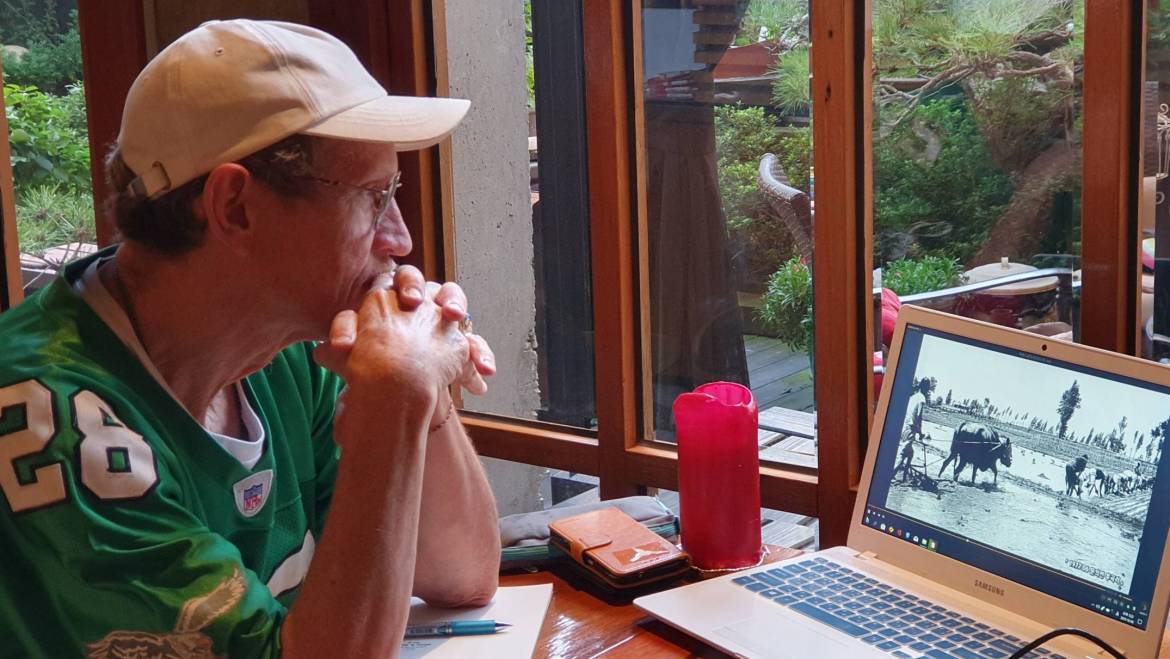
2 Comments
Richard, you never mentioned the legal phrase “eminent domain”, which is the way land is grabbed by entities for the good of the whole. Pipeline transmission companies, high voltage power lines, lakes, public highways, etc. are built according to the tenets of this legal phrase in America. Was this legal precedent used in Korea? I used to be in the pipeline business and we used it when needed. We once built a 360 mile natural gas transmission line from the panhandle of Texas, passing through the Paladuro Canyon and terminated in West Texas near Coyanosa, Texas. It was used many times when land owners would not accept the compensation the company offered. Also, my parents had a lake house on Lake Lavon which was impacted by the decision to raise the dam level 25 feet in the early 70s to dramatically increase the available drinking water in the lake. Lots of people lost their farms to the now much larger lake. As with Munui, Dallas needed water. Dallas’ peak water demand per day is one billion gallons. Wow. Dallas has many lakes and many water pipes in right of ways that were bought with this same eminent domain language. People can sue in court, but, all they will get is a little more money. They never get the land. As growth in populated areas increases, so must the lakes, the road systems and the power lines and water pipe line. Yes it is sad for a few, but it is good for the whole. And this is what we call progress. Darned if you do and darned if you don’t. Quite a conundrum.
How in the world did I fail to mention eminent domain (known as 저명한 도메인 here)??? That’s exactly what happened in Munui. Yes, quite a conundrum. You should have seen that video with the faces of people angry and sad about leaving their homes (and homes of ancestors going back more than 1,000 years). Another point you made is that the compensation is inadequate, and it surely was in this case.
Add Comment